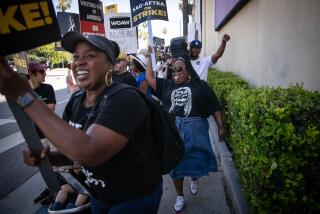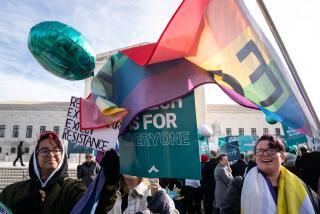Judge Voids $11-Million Jury Award
- Share via
A judge voided a jury’s $11.1-million verdict against Pitney Bowes Inc. over workplace bigotry and racial harassment of a salesman, ruling Friday the judgment so lacked evidentiary support that it “shocks the conscience of this court.”
Los Angeles County Superior Court Judge Malcolm H. Mackey dismissed the claim of Nigerian-born Akintunde I. Ogunleye, who alleged he was subjected to taunts of “ooga-booga” from a co-worker. Civil rights attorneys had called the September verdict the largest jury award in Los Angeles involving race discrimination claims by a worker who had not been fired. It was the second time in less than two years that Mackey has thrown out huge awards to civil rights plaintiffs.
Lawyers for Pitney Bowes hailed the decision, while Ogunleye’s lawyer and jurors who had found for him were critical.
Juror Dorothy Eccles said she believes she and her fellow jurors made the right decision and that Mackey’s ruling Friday weakens the judicial process.
“I’m disappointed the judge would do that after all our deliberating and after all the evidence that was presented to us,” said Eccles. “After all the evidence that was presented to us I think Pitney Bowes was guilty of discrimination.”
In his opinion, Mackey wrote that the alleged “ooga-booga” incident was “unfortunate,” but did not prove racial discrimination or emotional distress caused by Pitney Bowes. Mackey declined to comment on his written opinion.
“Is our society so fragile that a salesman cannot take isolated comments, in a world where our movies, TV and media constantly use language which is offensive and salacious?” Mackey wrote.
*
Margaret Henry, who represents Okunleye, said Mackey’s decision shows that he “does not understand either racism or the law. He has demonstrated through his opinions that he will not follow laws outlawing race discrimination.”
Pitney Bowes, which was also accused of giving Ogunleye less desirable sales areas and fostering a racially hostile environment, had asked Mackey to erase the judgment.
In the 19-page opinion, Mackey cited jury bias and repeatedly stressed there was insufficient evidence to prove that Ogunleye was discriminated against because of his race. He also found that Henry was guilty of misconduct by referring to Mark Furhman during the trial and introducing facts that were not proved. Henry charged that Mackey misconstrued information in his opinion.
In 1994, Mackey threw out an $89-million race discrimination jury verdict in favor of a black engineer for Hughes Aircraft Co. who claimed he was denied promotion because of his race. In that case, Mackey said the award was unsupported by the evidence.
In the opinion Friday, Mackey wrote that the jury’s award to Ogunleye was “disproportionate to the injuries, damages and conduct and so unsupported by the evidence that it shocks the conscience of this Court.”
Mackey granted Pitney Bowes a judgment notwithstanding the verdict--a rare but not unprecedented action.
Throughout his opinion, Mackey wrote that Ogunleye never filed proper complaints alleging racial discrimination, never complained to supervisors of racial harassment, and exaggerated minor incidents and disappointments in his work with Pitney Bowes into “intentional race discrimination.” But both Ogunleye and Henry countered that Mackey ruled that much of the evidence they submitted involving racial harassment and discrimination--including a handful of complaints Ogunleye lodged in 1993--was irrelevant.
“He took the proper channels and complained,” Henry said. “He complained to two different managers and no one ever got back to him with results of an investigation.”
Henry called Mackey’s decision ludicrous and said she will appeal.
Lester Jones, who represented Pitney Bowes, said the decision vindicated a company that has received several awards for its diversity efforts and community involvement. The Stamford, Conn.-based company is best-known for its postage meters and other mailing systems. Its worth is estimated at more than $1 billion.
“While the jury may have believed Mr. Ogunleye was treated unfairly, unfairness is not enough to be interpreted as racial discrimination,” Lester said.
Ogunleye filed the lawsuit against Pitney Bowes, parent company of U.S. Mailing Systems, after he resigned from the subsidiary’s Van Nuys sales office in 1994.
Listed in Ogunleye’s lawsuit were numerous instances of workplace bigotry over his four years there, including one in which a co-worker allegedly addressed him with “Akintunde, ooga-booga, jungle-jungle.” The co-worker, a French Canadian, testified that what he really said was “Bonjour, bonjour.”
Jones said managers investigated the “ooga-booga” incident and concluded it was a miscommunication between the employees.
Mackey wrote that Ogunleye’s complaints were “ordinary grievances that a salesman suffers on their day-to-day battle to earn commission.”
*
But Ogunleye said there was nothing ordinary about the racial slurs he endured during his years at the Van Nuys plant. And he questioned Mackey’s ruling and his dismissal of racial-harassment charges.
“If there’s no evidence then I would not stick myself, my family, my career on the line and go as far as I went,” Ogunleye said. “If there’s no evidence then how come the jury saw it differently?”
“What has happened has gone beyond reasoning,” Ogunleye said. “Why do we have a jury system in the United States? Twelve people listened to the case, 10 people said this is the verdict and one person said, ‘No, I’m going to use my power and take it away.’ ”
Mackey’s reversal of the verdict decided the case in favor of Pitney Bowes.
More to Read
Inside the business of entertainment
The Wide Shot brings you news, analysis and insights on everything from streaming wars to production — and what it all means for the future.
You may occasionally receive promotional content from the Los Angeles Times.










